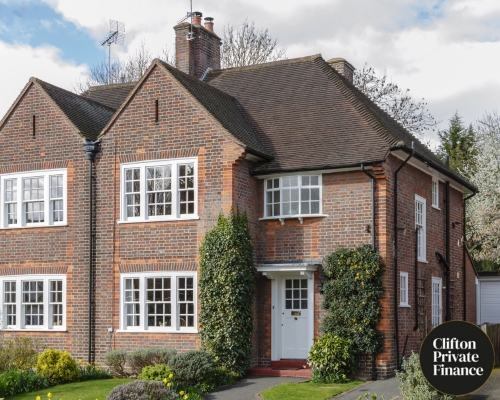Categories
Bridging loan FAQs

Can you get one, how much will it cost, how can you repay it… 8 key questions in our quick guide to short-term property finance.
1. What is a bridging loan?
This is a type of short term property finance used to "bridge" a temporary gap in funding: to allow property purchases or development to move ahead quickly when other finance isn’t available, or has fallen through.
- It can make you effectively a cash buyer, leapfrogging to the front of a queue of qualified purchasers.
- Enables a discounted purchase at auction - when there's not enough time to set up mortgage finance, or a property may not be in mortgageable condition.
A bridging loan is secured against the value of assets (usually property), and will have a clearly defined exit strategy agreed with the lender for repayment of the loan.
Closed or open bridge
- A "closed bridge" loan is when the date for repayment is set – for example, the completion date for the sale of your home has already been agreed.
- An "open bridge" is when the exit strategy is agreed (for example, completing renovations and then selling, or refinancing) but the date is not fixed.
First or second-charge bridging loan
A first-charge bridging loan is a short-term mortgage using an unencumbered property as security - for example, a home that you've paid off the mortgage on, or a new property that you're purchasing.
A second-charge bridging loan is a second, additional mortgage secured against an already-mortgaged property that you own.
A second charge loan could be useful if you've tried getting an extension to the mortgage on a property from your original mortgage lender, but you've been turned down – which could be because your financial circumstances have changed, or their criteria don’t allow for it.
The lending criteria for a second charge mortgage on the same property, from a different lender, can be more flexible - because these lenders are focused on the value of the property rather than your earnings.
Interest rates on second-charge bridging loans are higher than for standard mortgages, because a second charge is second in the queue for repayment if it comes to reclaiming the value of the property.
Regulated or unregulated
- If the property that a bridging loan is secured against (either as a first or second charge) is your own home, or the home of a family member, the terms of the loan are regulated by the Financial Conduct Authority (FCA) and the maximum term is limited.
- If the property is not a family home, or if the loan against a family home is for more than £25,000 and intended for business purposes, or if the borrower is regarded as a high net worth individual, then the bridging loan will be unregulated and may have more flexible terms.
2. How much does a bridging loan cost?
You will pay interest on the loan, and usually some other set-up fees, but the costs don’t all need to be paid upfront.
- Interest: the rate you're quoted will be per month, and will depend on: current interest rates; your assets and LTV; your credit rating; whether this is a first or second-charge loan. Current short-term interest rates range from 0.44% to 1.35%+.
- Valuation fee: for the valuation survey arranged by the lender. If the circumstances allow for an online valuation this fee could be £0-£99. Otherwise, from £250-£1,000, depending on the value of the property.
- Lender’s arrangement fee: usually about 1% of the loan amount, payable only if you take up the loan facility.
- Legal fees: including conveyancing fees and a solicitor’s “undertaking”.
- Broker’s set-up fee: to cover their costs in finding the most suitable lender for you, and getting your application approved as quickly as possible.
- Exit fee: (occasionally, depending on your lender) covering the legal costs of “releasing the legal charge”.
If all this is looking prohibitive, don’t worry: the only costs which need to be paid upfront are the valuation costs, broker’s fee and the solicitors’ undertaking.
All other costs, including the monthly interest payments, can be “rolled up” into the total loan and will be paid for at the end by your exit financing (usually a mortgage, or a property sale you have been waiting to be completed).
3. Can I get a bridging loan?
Yes – if you have sufficient equity in an asset (low loan-to-value, or LTV) to secure the loan, and a clear exit plan for repaying the loan.
Your exit plan might be the finalised sale of a property that’s already on the market, for example, or longer-term finance on a property that has now been renovated to mortgageable standard.
4. What if I’ve got a bad credit rating?
You can still get a bridging loan if you have an impaired credit record: many private lenders are focused solely on the value and location of the property they're lending against, and are happy to lend to clients with a credit rating that traditional lenders would not consider.
As part of the application you will be asked for details of your income, expenditures, assets and liabilities. Actual proof of income will depend on whether the bridging loan is regulated or not, and you may still be offered a bridging loan if you have no regular income, if you have a good LTV on the asset you’re offering as security.
5. How long does it take to get a bridging loan?
- Clifton Private Finance can get you a Decision in Principle from a lender within 24 hours of you contacting us
- You will usually get a Formal Offer from the lender within the next 5 days (and even quicker if the lender can co an online valuation)
- You will typically get Completion (money in your account) within another 10 days
All up, three weeks from start to finish, unless it's a particularly complicated deal.
For anyone with experience of applying for a mortgage with a high-street lender, which can take up to three months to process at the busiest buying times of year, this is reassuringly quick. But for your own protection it’s not instantaneous.
Using a solicitor who's experienced in property finance can make a big difference. Solicitors are risk-adverse by training - and so they should be - but when you want to move fast you want a legal adviser who understands the usual bridging finance process.
6. How long can you have a bridging loan for?
Regulated bridging loans, secured against a borrower’s home (or the home of their partner or a family member) are limited to a maximum of 12 months. (If you need finance for longer than this, a bridging loan may not be the most suitable type of lending for you.)
Unregulated loans on a property that isn't a family home, or commercial properties can usually extend for up to two years. (Again, for a longer time period a different type of development finance might be more cost-effective.)
You will usually be encouraged to take out a bridging loan for the maximum period possible, to allow for exit contingencies. Your property might not sell as quickly as you’d hoped, or there may be delays on renovation or development works.
If there’s a good possibility you could repay the loan earlier, your broker will find you a lender who doesn’t charge a penalty for early repayment.
7. What happens if I can’t pay the loan back at the end of the term?
Ultimately, your lender could take possession of your secured assets to get their money back. But for reputable lenders that’s not good business for them.
Lenders will usually be in contact as your repayment date approaches, to check that your exit plan is still viable. If there’s a good reason why you need an extension (for example if you have an offer on your property, but your buyer isn’t able to complete in time), most lenders will be prepared to give you more time to complete your exit and repay.
8. How do I apply for a bridging loan?
You may be able to find bridging finance directly from a high street bank or building society. But there are other private lenders who are only accessible via broker intermediaries (such as Clifton Private Finance). This is a fairly complex type of finance and you need to look beyond the headline interest rate to get the finance that suits your circumstances best.
A well-connected broker will know of all the lenders available to you in the market, and will "package" your application so it meets the criteria of the most appropriate lender for you, so that you get a loan offer back within a matter of days.
Contact our bridging finance team at Clifton Private Finance:


















